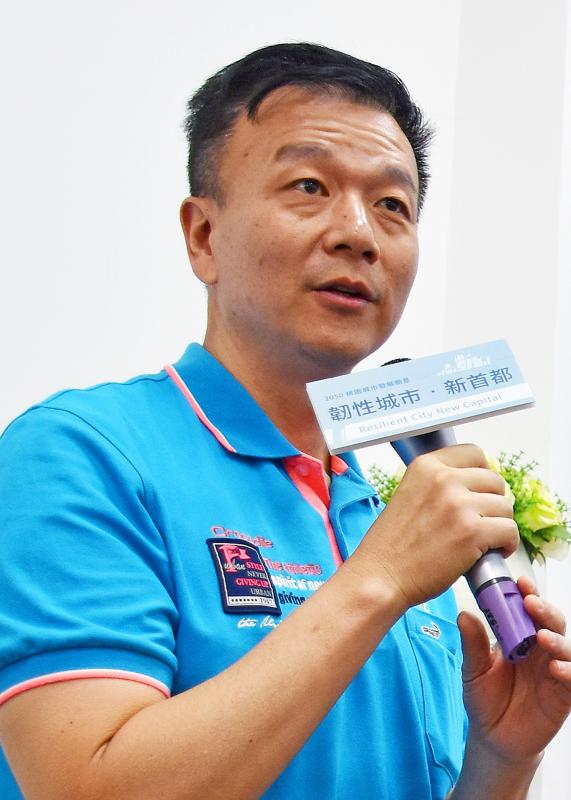Retired army general Yu Pei-chen (于北辰) on Friday said that he was leaving the Chinese Nationalist Party (KMT) and voiced his support for the Democratic Progressive Party’s Lin Ching-yi (林靜儀), who is to run in a by-election on Sunday next week.
Yu made the announcement during an appearance on a talk show. The by-election is to fill Taichung’s second electoral district seat, left vacant following the recall of former legislator Chen Po-wei (陳柏惟) of the Taiwan Statebuilding Party in October last year.
Yu said he supported justice, the Republic of China and the Republic of China Army, and not a local faction.

Photo: Lee Jung-ping, Taipei Times
KMT by-election candidate Yen Kuan-heng (顏寬恒) yesterday accused Yu of “selling out his soul” for NT$3,000 — the fee for attending the talk show — and said that regardless of ideology, political parties must have a core idea that defines them.
“Without that central core, political parties are not that different from chain convenience stores,” he added.
Yu yesterday said that Yen, coming from a wealthy family, should not insult convenience store workers, who he said have to work hard for a living.
Lin thanked Yu for his support, saying that regardless of Yu’s previous party affiliation, she and Yu now agree “that we must resist the Chinese Communist Party [CCP] and protect Taiwan together.”
Yu had been a loyal KMT member for more than 30 years and hoped the party could change, Lin said, adding that Yen’s criticism of a former party member was unnecessary.
Yu had previously said that the KMT’s insistence on the so-called “1992 consensus” was detached from reality.
Former president Ma Ying-jeou (馬英九) yesterday said that Yu might have some misunderstandings about cross-strait relations, adding that he would gladly clarify the issues to Yu if given the chance.
The “1992 consensus” — a term former Mainland Affairs Council chairman Su Chi (蘇起) in 2006 admitted making up in 2000 — refers to a tacit understanding between the KMT and the CCP that both sides of the Taiwan Strait acknowledge that there is “one China,” with each side having its own interpretation of what “China” means.

ACTION PLAN: Taiwan would expand procurement from the US and encourage more companies to invest in the US to deepen bilateral cooperation, Lai said The government would not impose reciprocal tariffs in retaliation against US levies, President William Lai (賴清德) said yesterday, as he announced five strategies to address the issue, including pledging to increase Taiwanese companies’ investments in the US. Lai has in the past few days met with administrative and national security officials, as well as representatives from various industries, to explore countermeasures after US President Donald Trump on Wednesday last week announced a 32 percent duty on Taiwanese imports. In a video released yesterday evening, Lai said that Taiwan would not retaliate against the US with higher tariffs and Taiwanese companies’ commitments to

Intelligence agents have recorded 510,000 instances of “controversial information” being spread online by the Chinese Communist Party (CCP) so far this year, the National Security Bureau (NSB) said in a report yesterday, as it warned of artificial intelligence (AI) being employed to generate destabilizing misinformation. The bureau submitted a written report to the Legislative Yuan in preparation for National Security Bureau Director-General Tsai Ming-yen’s (蔡明彥) appearance before the Foreign Affairs and National Defense Committee today. The CCP has been using cognitive warfare to divide Taiwanese society by commenting on controversial issues such as Taiwan Semiconductor Manufacturing Co’s (TSMC, 台積電) investments in the

HELPING HAND: The steering committee of the National Stabilization Fund is expected to hold a meeting to discuss how and when to utilize the fund to help buffer the sell-off The TAIEX plunged 2,065.87 points, or 9.7 percent, to close at 19,232.35 yesterday, the highest single-day percentage loss on record, as investors braced for US President Donald Trump’s tariffs after an extended holiday weekend. Amid the pessimistic atmosphere, 945 listed companies led by large-cap stocks — including Taiwan Semiconductor Manufacturing Co (TSMC, 台積電), Hon Hai Precision Industry Co (鴻海精密) and Largan Precision Co (大立光) — fell by the daily maximum of 10 percent at the close, Taiwan Stock Exchange data showed. The number of listed companies ending limit-down set a new record, the exchange said. The TAIEX plunged by daily maxiumu in just

‘COMPREHENSIVE PLAN’: Lin Chia-lung said that the government was ready to talk about a variety of issues, including investment in and purchases from the US The National Stabilization Fund (NSF) yesterday announced that it would step in to staunch stock market losses for the ninth time in the nation’s history. An NSF board meeting, originally scheduled for Monday next week, was moved to yesterday after stocks plummeted in the wake of US President Donald Trump’s announcement of 32 percent tariffs on Taiwan on Wednesday last week. Board members voted to support the stock market with the NT$500 billion (US$15.15 billion) fund, with injections of funds to begin as soon as today. The NSF in 2000 injected NT$120 billion to stabilize stocks, the most ever. The lowest amount it